-
- About the Department
- Vision
- Mission
- Program Educational Objectives (PEOs)
- Program Outcome (POs)
- Program Specific Outcomes (PSOs)
- Faculty
- Magazines
- Syllabus & Course Outline
- Laboratories
- Practices & Innovation in Teaching Learning
- Professional Society
- Departmental Activities(Guest Lectures & Industrial Visits)
- Academic Calendar
- Project
- Research & Development
Department of Electronics & Communication Engineering
Electronics & Communication Engineering deals with the electronic devices, circuits and communication equipment like transmitters, receivers, and integrated circuits (IC). It also deals with basic electronics, analog and digital transmission & reception of data, voice and video (Example AM, FM, DTH), microprocessors, satellite communication, microwave engineering, antenna and wave propagation. It aims to deepen the knowledge and skills of the students on the basic concepts and theories that will equip them in their professional work involving analysis, systems implementation, operation, production, and maintenance of the various applications in the field of Electronics and Communications Engineering.
This branch focused on designing, developing, and testing electronic circuits and communication systems. It involves utilizing principles of digital and analog signal transmission and reception, working with microprocessors, and understanding communication technologies like satellite communication. The department has well qualified, experienced and dedicated faculty ready to keep pace with the advances in the field of Electronics & Communication Engineering. It has laboratories that are manned by experienced trainers.
Vision
To promote excellence in the field of Electronics & Communication Engineering and allied domains through quality education and develop valuable assets for industry and society with incorporation of moral values and ethics.
Mission
- M1- To allocate quality education in the field of Electronics & Communication Engineering through a multidisciplinary approach and effective teaching-learning process.
- M2- To strengthen the institution-industry relationship to make students well versed with the latest technologies and current industrial needs in Electronics & Communication Engineering and related sectors.
- M3- To promote entrepreneurship, professional ethics, leadership skills and moral values with enthusiasm for lifelong learning.
Program Educational Objectives (PEOs)
- PEO1:-Graduate will compete on various platforms to pursue their professional career in Electronics and Communication Engineering and allied disciplines.
- PEO2:– Graduate will be able to effectively analyse and solve engineering problems both in the industry and research sector with the help of appropriate techniques, tools and principles of Electronics & Communication Engineering.
- PEO3:– Graduate with effective communication will have the ability to work as an able leader and a competent team member.
Program Outcome (POs)
Engineering knowledge
Apply the knowledge of mathematics, science, engineering fundamentals, and an engineering specialization to the solution of complex engineering problems.
Problem analysis
Identify, formulate, review research literature, and analyse complex engineering problems reaching substantiated conclusions using first principles of mathematics, natural sciences, and engineering sciences.
Design/development of solutions
Design solutions for complex engineering problems and design system components or processes that meet the specified needs with appropriate consideration for the public health and safety, and the cultural, societal, and environmental considerations.
Conduct investigations of complex problems
Use research-based knowledge and research methods including design of experiments, analysis and interpretation of data, and synthesis of the information to provide valid conclusions.
Modern tool usage
Create, select, and apply appropriate techniques, resources, and modern engineering and IT tools including prediction and modelling to complex engineering activities with an understanding of the limitations.
The engineer and society
Apply reasoning informed by the contextual knowledge to assess societal, health, safety, legal and cultural issues and the consequent responsibilities relevant to the professional engineering practice.
Environment and sustainability
Understand the impact of the professional engineering solutions in societal and environmental contexts, and demonstrate the knowledge of, and need for sustainable development.
Ethics
Apply ethical principles and commit to professional ethics and responsibilities and norms of the engineering practice.
Individual and teamwork
Function effectively as an individual, and as a member or leader in diverse teams, and in multidisciplinary settings.
Communication
Communicate effectively on complex engineering activities with the engineering community and with society at large, such as, being able to comprehend and write effective reports and design documentation, make effective presentations, and give and receive clear instructions.
Project management and finance
Demonstrate knowledge and understanding of the engineering and management principles and apply these to one’s own work, as a member and leader in a team, to manage projects and in multidisciplinary environments.
Life-long learning
Recognize the need for, and have the preparation and ability to engage in independent and life-long learning in the broadest context of technological change.
Program Specific Outcomes (PSOs)
- The ability to identify and apply the concepts of digital systems, signal processing & wireless communication to cater the current needs of the growing global industry
- The ability to understand the technological advancements in the field of Embedded systems & Robotics by using different tools like MATLAB, PSPICE to analyze and design systems to provide solution to various problems.
Faculty Of Electronics & Communication Engineering
| Name of the Faculty | Designation | Department | Highest Qualification |
| VIVEK KUMAR SINGH | ASST PROFESSOR (HOD) | ELECTRONICS & COMMUNICATION ENGG | M TECH |
| SANJEEV KUMAR | ASST PROFESSOR | ELECTRONICS & COMMUNICATION ENGG | M TECH |
| VIJAY SRIVASTAVA | ASST PROFESSOR | ELECTRONICS & COMMUNICATION ENGG | M TECH |
| SHATANJAY MISHRA | ASST PROFESSOR | ELECTRONICS & COMMUNICATION ENGG | M TECH |
| NAVEEN TIWARI | ASST PROFESSOR | ELECTRONICS & COMMUNICATION ENGG | M TECH |
| IMRAN AHMAD | ASST PROFESSOR | ELECTRONICS & COMMUNICATION ENGG | M TECH |
| SANA FATIMA | ASST PROFESSOR | ELECTRONICS & COMMUNICATION ENGG | M TECH |
| AKSHITA SRIVASTAVA | ASST PROFESSOR | ELECTRONICS & COMMUNICATION ENGG | M TECH |
| SAURABH KUMAR | ASST PROFESSOR | ELECTRONICS & COMMUNICATION ENGG | M TECH |
| RAHUL SINGH | ASST PROFESSOR | ELECTRONICS & COMMUNICATION ENGG | M.TECH |
Syllabus & Course Outline
Laboratories
-
The department has established following laboratories:
- Operating System Lab
- Electronics Lab
- Microwave Lab
- PCS Workshop & Design
- Computer Aided Design & Simulation Lab
- Digital Electronics Lab
- Communication Lab
- Instrumentation & Measurement Lab
- Microprocessor Lab
- Digital Signal Processing Lab
Practices & Innovation in Teaching Learning
RRIMT adopts a comprehensive and student-centered approach to teaching and learning, ensuring that our students are equipped with both the theoretical foundation and practical skills necessary to succeed in the competitive field of software development. Our teaching-learning methodologies are designed to promote critical thinking, problem-solving, hands-on experience, and industry relevance.
- Student-Centered Learning Approach
We follow a student-centered approach that encourages active participation, deep learning, and collaborative efforts. This methodology aligns with the current trends in education and enhances the overall learning experience by promoting greater engagement with the subject matter.
-
-
- Interactive Lectures
-
-
-
- Project-Based Learning
-
- Blended Learning
A combination of traditional classroom learning and online resources is employed to cater to different learning styles and preferences. Blended learning ensures that students not only grasp foundational concepts but also have access to additional learning material such as online tutorials, videos, and software development tools.
-
-
- e-Learning Platforms
-
-
-
- Flipped Classroom Model
-
- Hands-On Learning
In the software branches, practical learning is at the core of our methodology. We provide students with the necessary tools, platforms, and environments to apply the concepts they learn in real-time.
-
-
- Laboratory Work
-
-
-
- Industry Tools & Software
-
- Collaborative Learning and Peer Interaction
We emphasize collaborative learning, where students work in teams, mimicking industry settings. This approach develops their interpersonal and communication skills, both of which are crucial in the software development field.
-
-
- Group Projects and Hackathons
-
-
-
- Peer Review & Code Sharing
-
- Industry-Institute Interface
A key element of our teaching-learning methodology is maintaining close ties with the industry. This ensures that students are exposed to the latest trends, tools, and technologies used in the software industry.
-
-
- Industrial Visits
-
-
-
- Guest Lectures and Workshops
-
-
-
- Internships
-
- Continuous Assessment and Feedback
Assessment is an ongoing process designed to evaluate both theoretical understanding and practical skills development.
-
-
- Formative Assessments: Regular quizzes, assignments, presentations, and coding challenges assess students’ understanding and progress throughout the course.
- Summative Assessments: At the end of each semester, students undergo final exams and major projects to demonstrate their competency in software engineering concepts.
- Feedback Mechanisms: Continuous feedback from faculty, industry mentors, and peer reviews is incorporated to guide students and improve their performance.
-
- Industry-Relevant Curriculum
The curriculum is designed to match the current needs and trends of the software industry, ensuring that students are well-prepared to tackle real-world software engineering challenges.
-
-
- Modular Approach
-
-
-
- Capstone Projects
-
- Outcome-Based Education (OBE)
Our teaching-learning methodology is in line with the Outcome-Based Education (OBE) framework, which focuses on the outcomes and results of the learning process. The curriculum and teaching methods are aligned with specific program outcomes (POs) and program educational objectives (PEOs), ensuring that graduates meet the professional, ethical, and technical expectations of the software industry.
At R.R. Group of Institutions, we are committed to delivering a high-quality education in Software Engineering through an innovative and effective teaching-learning methodology. Our approach integrates theoretical knowledge with practical experience, ensuring that our students are not only prepared to meet the challenges of the industry but also equipped to lead and innovate in the evolving field of software development.
Activities & Guest Lectures
Department of Electronics & Communication Engineering, RR Institute of Modern Technology, Lucknow organized an Industrial visit at Indian Space Research Organization, Lucknow on 5th December 2024.ISRO is an important body in India and spearheads research in space science in India, also playing a huge role in the development of the country through educational, agricultural, communication, and defence sector projects.Students of EC Department visited to the various sections of ISRO campus. The Scientist Dr. D. K. Mishra explained about working of the Satellite tracking, monitoring and controlling mechanism
and shows live monitoring data of digital and analog communications into different monitoring sections like Ground Station, controlling station, Monitoring station and communication station and observed the complete working of satellite communication in presence of Mr. Vivek Kumar Singh (Assistant Professor, HOD-EC Department) and Mr. Vijay Srivastava (Assistant Professor, EC Department)
EC Department is very thankful to the Management of the RR Institute of Modern Technology, Lucknow for their enormous support and motivation to organise such a phenomenal visit for our students.
Careers
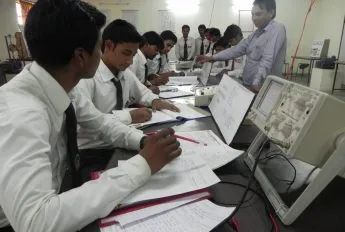
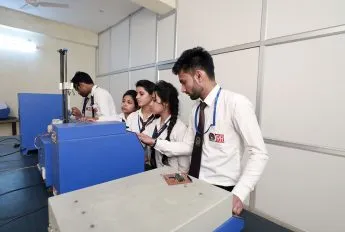
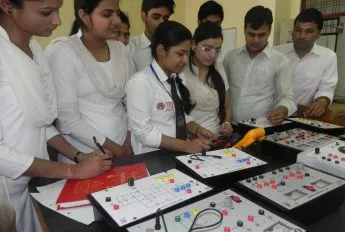
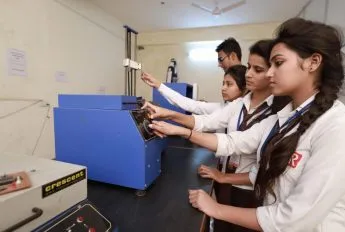
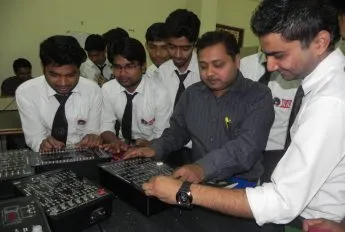
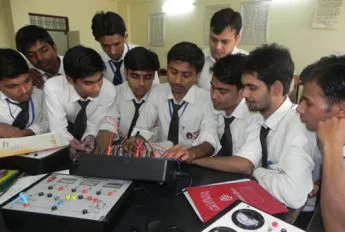
- Address
NH-24, Bakshi Ka Talab, Sitapur Road, Lucknow-226201 (UP) India - Phone
8756008853, 9161888853, 18001020833 (Toll Free) - Email
admissions@rrgi.in - rrimtedu@gmail.com
Department of Electronics & Communication Engineering
This branch deals with analog and digital transmission, reception of data, voice and video, basic electronics, solid state devices, microprocessors, digital analog communication, microwave engineering, antennae, wave propagation, etc. The department has well qualified, experienced and dedicated faculty ready to keep pace with the advances in the field of Electronics & Communication Engineering. It has laboratories that are manned by experienced trainers.
Vision
To promote excellence in the field of Electronics and Communication Engineering and allied domain through quality education to provide valuable assets for industry & society and inculcating moral values & ethics.
Mission
- To allocate quality education through technically sound curriculum and effective teaching-learning process.
- To strengthen institution-industry relationship to make students well versed with latest technologies and current industrial needs.
- To promote entrepreneurship, professional ethics, leadership skills and moral values with enthusiasm for lifelong learning.
Program Educational Objectives (PEOs)
- Graduate will compete on global platform to pursue their professional career in Electronics and Communication Engineering and allied disciplines.
- Graduates will be able to effectively analyse and solve engineering problems with the help of appropriate techniques and advanced tools both in industry and in academic sector.
- Graduates will communicate efficiently to work as an able leader and a competent team member.
Program Outcome (POs)
Identify, formulate, review research literature, and analyse complex engineering problems reaching substantiated conclusions using first principles of mathematics, natural sciences, and engineering sciences.
Design solutions for complex engineering problems and design system components or processes that meet the specified needs with appropriate consideration for the public health and safety, and the cultural, societal, and environmental considerations.
Use research-based knowledge and research methods including design of experiments, analysis and interpretation of data, and synthesis of the information to provide valid conclusions.
Create, select, and apply appropriate techniques, resources, and modern engineering and IT tools including prediction and modelling to complex engineering activities with an understanding of the limitations.
Apply reasoning informed by the contextual knowledge to assess societal, health, safety, legal and cultural issues and the consequent responsibilities relevant to the professional engineering practice.
Understand the impact of the professional engineering solutions in societal and environmental contexts, and demonstrate the knowledge of, and need for sustainable development.
Apply ethical principles and commit to professional ethics and responsibilities and norms of the engineering practice.
Function effectively as an individual, and as a member or leader in diverse teams, and in multidisciplinary settings.
Communicate effectively on complex engineering activities with the engineering community and with society at large, such as, being able to comprehend and write effective reports and design documentation, make effective presentations, and give and receive clear instructions.
Demonstrate knowledge and understanding of the engineering and management principles and apply these to one’s own work, as a member and leader in a team, to manage projects and in multidisciplinary environments.
Recognize the need for, and have the preparation and ability to engage in independent and life-long learning in the broadest context of technological change.
PROGRAM SPECIFIC OUTCOME (PSOs)
- The ability to identify and apply the concepts of digital systems, signal processing & wireless communication to cater the current needs of the growing global industry
- The ability to understand the technological advancements in the field of Embedded systems & Robotics by using different tools like MATLAB, PSPICE to analyze and design systems to provide solution to various problems.

ANURAG AWASTHI
ASST PROFESSOR (M.Tech.)

CHANCHAL NIGAM
ASST PROFESSOR (M.Tech.)

AJAY KUMAR
ASST PROFESSOR (M.Tech.)

MANISH DUBEY
ASST PROFESSOR (M.Tech.)

SANDEEP RATHOUR
ASST PROFESSOR (M.Tech.)

SHANTANJAY MISHRA
ASST PROFESSOR (M.Tech.)

SAURABH KUMAR
ASST PROFESSOR (M.Tech.)

PREETI KUSHWAHA
ASST PROFESSOR (M.Tech.)

NIRENDRA KUMAR NISHAD
ASST PROFESSOR (M.Tech.)

ABHINAV KUMAR
ASST PROFESSOR (M.Tech.)

PRABHAKAR DUBEY
ASST PROFESSOR (M.Tech.)

MOHD ZUBAIR ALAM
ASST PROFESSOR (M.Tech.)
Duties of an EC Engineer
- Design and maintain satellites, which bring TV, telephone and Internet service into remote and rural regions
- ECE Engineers also creates advanced communication facilities like video conferencing which bring people together from all over the world
- Develops programs for various control and communication systems
In order to excel as one of the best electronics and communication engineering colleges in Lucknow, RRIMT has installed state-of-the-art facilities and appointed some of the finest teachers for B.Tech in Electronics and Communications.
The department has established following laboratories:
- Operating System Lab
- Electronics Lab
- Microwave Lab
- PCS Workshop & Design
- Computer Aided Design & Simulation Lab
- Digital Electronics Lab
- Communication Lab
- Instrumentation & Measurement Lab
- Microprocessor Lab
- Digital Signal Processing Lab